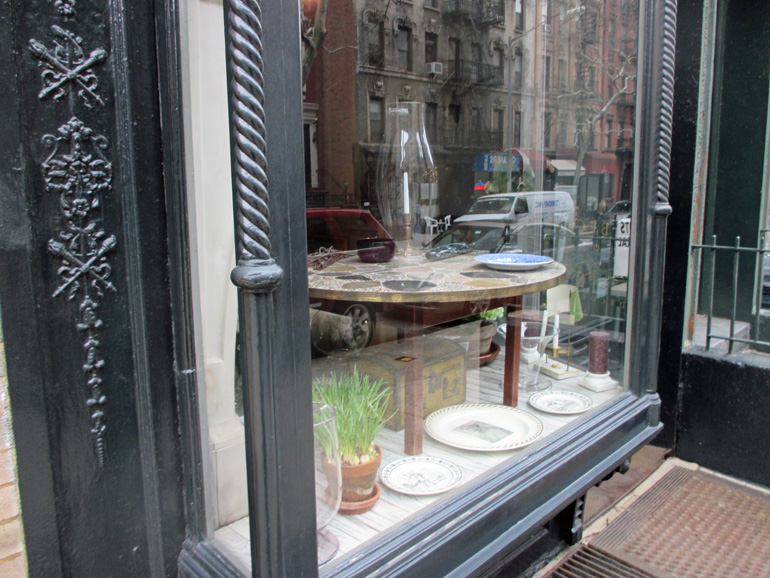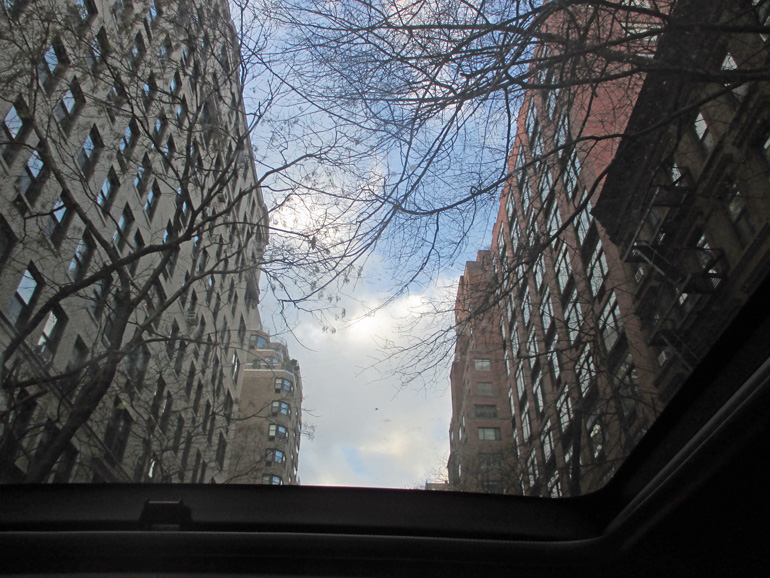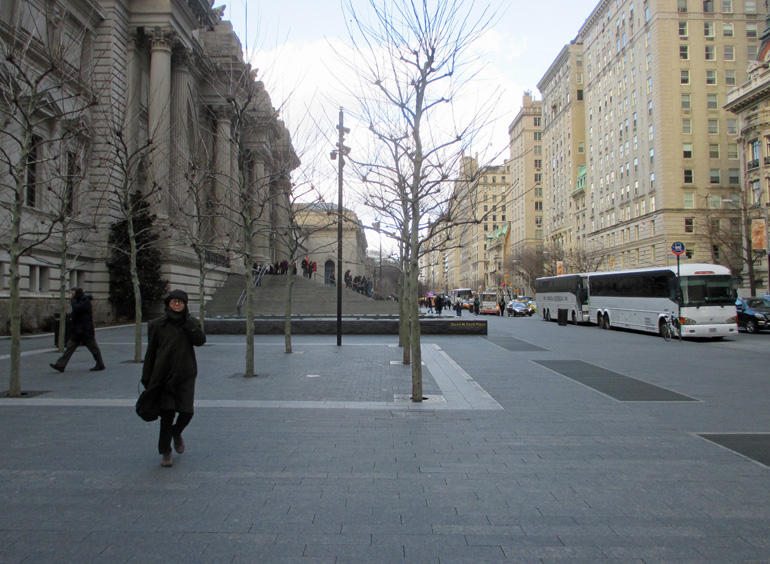Gotham Diary:
Ravished
February 2018 (IV)
Tuesday, February 27th, 2018
27 February; 1 and 2 March
Tuesday 27th
Max Boot has written a might-have-been book about Vietnam, or at least that is how reviewers are approaching his biography of Edward Lansdale, The Road Not Taken. Louis Menand, writing in The New Yorker, makes a connection that, oddly, Boot doesn’t: Lansdale was a model for Colonel Hillandale in The Ugly American, the suite of satirical vignettes published by Eugene Burdick and William Lederer in 1958.
I may not remember when The Ugly American came out, exactly, but I remember when it was new, and much talked about (it stayed on the best-seller list for over a year). I couldn’t have been less interested. Growing up in the fifties, I didn’t need to be told that Americans were ugly. And ugly wasn’t the worst of it. At least you could look the other way if a photograph of first lady Mamie Eisenhower came up — my Lord, how drab and plain and out-of-place she looked; in comparison, Eleanor Roosevelt possessed the dignified hideousness of genuine royalty — but could you shut out the braying of grown men shilling the glories of big business? No. But metaphorically, I kept my fingers in my ears until I reached the piece and quiet of boarding school. By then, President Kennedy was already setting a new style for more measured discourse and subtler enthusiasm.
Still, I wasn’t interested in Asia, certainly not in present-day Asia. I was doubly not interested. Asian civilizations didn’t appeal to me, and the value of Asian nations — aside from Thailand and Japan, all of them only recently independent of foreign domination — as pawns in the Cold War appealed to me even less. The Cold War was as obnoxious as the braying about business, even if it was conducted in winks, nods, and whispers. And although I didn’t quite grasp that the nasty hot war in Vietnam was a collaboration of ideology and project financing, I understood that it was stupid and pointless. I do wish that I’d read The Ugly American at the time — in the late Sixties, anyway. As it happens, I bought a copy a while back, and was even able to find it. Reading it was great fun. Well, I laughed a lot. But Burdick and Lederer might as well have signed their book “Cassandra,” for it was no more likely that Americans would either avoid intervention in Vietnam or that they would intervene effectively than it was that Oedipus would marry somebody not his mother.
As I read through The Ugly American, I reflected on the problems of the British in India, which seemed fundamentally similar.
- With regard to armed conflict, the British never learned to engage with Indians on the same terms. Either they overwhelmed them with crushing, hateful force, or they wasted their bullets.
- British civil servants in India not only lived in gated communities but enjoyed a higher standard of living than their pay would have allowed them back home. This attracted opportunists.
- The British committed themselves, with a combination of high-mindedness and profit-seeking, to “modernizing” India. This had nothing to do with real modernization, which would have attempted to bring Indian culture into line with Enlightenment values. It was merely a program of capital development that meant little or nothing to lives of ordinary Indians. The difference is highlighted by the fact that the Subcontinent’s extensive railways were not accompanied by urban sewage systems.
It seemed to me that Burdick and Lederer were suggesting that the follies of American aid in Southeast Asia were much the same, but just in case I failed to infer this from the mordant humor, they spelled it all out in an Epilogue.
- American military leaders ought at least to read the writing of Mao Zedong. Two central chapters (11 and 12) in The Ugly American illustrate this point with cinematic gusto. Sixty years later, the American military is not very good at guerilla war. To be sure, the greatest impediment is overcoming the tribal nature of guerilla tactics: how does a tall, strapping blonde from Alabama blend in among smaller men with different features? But it doesn’t appear that much effort has been made. We are still drilling uniformed men as if it were 1600. (Perhaps drones will make guerilla warfare obsolete.)
- Foreign-service recruitment in Washington and elsewhere presented a garishly vulgar picture of expat life in Southeast Asia, representing it as one big cocktail party punctuated by shopping sprees at the PX. This not only appealed to “mediocrities,” as Burdick and Lederer repeatedly call them, but repelled idealists who might have put service before career advancement.
- Southeast Asians are peasants — subsistence farmers, preoccupied by getting enough to eat — and they need the kind of agricultural aid that (you’d think) the American land-grant universities were designed to provide. Better livestock management, more efficient water pumps — cheap, small scale improvements to the lives of ordinary country people. And yet all the Americans could think of offering were highways and canals.
One truly dismal side-effect of reading The Ugly American these days is concluding that Americans didn’t even learn anything from Vietnam: the failure was indeed totally complete. There’s something about our gun-control problem that seems deeply stupid in the same way the the misadventure in Vietnam was deeply stupid — the kind of stupidity that only meritocrats like Robert McNamara can whip up.
***
***
Thursday 1st
Fire and Fury: Inside the Trump White House has been sitting at the bottom of my book pile for a few weeks. When I got it, I read a chunk of it, then set it aside. It’s dispiriting stuff, and, during the past couple of weeks, I’ve often wondered why I bought it. Surely not just because everybody else did! Michael Wolff writes very well, but the subject matter is something else, right?
A day or so ago, I saw that I must decide whether to finish the book or to toss it. If it hadn’t been as well-written as it is, I’d have tossed it. But I picked it up instead and forged on. I was surprised to discover that it was no longer so unpleasant. Indeed, it had become, somehow, excitingly revelatory. It wasn’t that there were things in Fire and Fury that I didn’t really “know.” But there was something big that I hadn’t figured out.
It is a commonplace in my part of the world to pronounce Donald Trump as unfit to be president. He’s uneducated (not for lack of tuition payments); he won’t read, he won’t learn, he won’t listen. He believes that he already knows everything that needs to be known. This is political and institutional heresy to almost everyone in his entourage. Wolff tells us that, in the early days of the administration, many White House staffers resolved their cognitive dissonance by deciding that, having won the election, Trump must know something. But it isn’t what Trump knows. Trump doesn’t need to know anything. It’s who he is. Who is he? He is John Q Public, that’s who. He represents everyone in this country, everyone in the Western world, who is sick and tired of the smoky atmosphere of secret knowledge that surrounds all the institutions of public life. When Trump asks why he can’t do something, he wants an answer that anybody could understand, in three sentences max. And then he’s going to do what he wants to do.
Trump represents the voter who isn’t interested in studying the ins and outs of governments, and who doesn’t think it should be necessary. He’s the voter who is tired of being lied to.
There has been a lot of lying. For at least two generations, politicians and other public officials have deemed the public incapable of grasping the truth about anything, which is, basically, it’s complicated, and, even more basically, we’re on the take. As I was reading Fire and Fury, I was wondering how it was that Washington, DC, with its avenues of orderly beaux-arts office buildings and its legions of capable aides like Katie Walsh, came to be regarded as a swamp. How could something so highly organized be associated with shapeless slime? The answer — my answer, anyway — it twofold. At bottom, Washington has been purchased/corrupted by business interests. Without the financial support of these interests, it would be impossible for men and women from middle-class backgrounds to attain elected office, and they would face penniless retirement when their terms came to an end. The awful truth about representative democracy is that it requires a disinterested class of independently wealthy public servants. Failing that, our government is run by the dependently wealthy.
As for the it’s complicated issue, that’s the awful truth about all large institutions. Their complexity increases and then sprawls. All institutions are abstractions designed to organize the behavior and effort of many people: they’re really nothing more than what people think they are. Looking back on a thousand years of institutional history in the West, I think it fair to say that most institutions degrade over time in a very specific way: maintaining the existence of the institution becomes more important to its officials than the quality of its output.* And, even if that doesn’t happen, the output of an institution will, over time, cease to serve its intended purpose. Society evolves, and values evolve with it. Once upon a time, gentle birth was the sine qua non of political advancement. Nowadays, it’s doing well on tests — although that’s not working so well right now. No one has yet figured out how to identify and promote, in any systematic way, intelligent men and women of strong moral character.
The good thing about having Donald Trump in the White House is that he’s bored and irritated by institutional procedure — just like everyone who isn’t already part of it. Steve Bannon could hold Trump’s attention by entertaining him, usually with apocalyptic forecasts that miraculously involved success for the President. Many voters were similarly entertained, and they paid for their entertainment with votes. They didn’t expect Donald Trump to reveal that he was made of presidential timber. They expected him to go on being just like them. Whether this is a viable development in the government of the United States remains to be seen, but we know from Trump what it is that ordinary people want. We know from him what turns them off. We might actually learn from paying attention to him how to make our institutions more responsive and effective, or indeed how to design new institutions. This is the point to which our society has evolved — it has no more patience with meritocrats. If you regard an electorate made up of millions of Trumps as hopelessly degenerate, then there is nothing for you to do for the life of this country.
*Perhaps because its output is raw, absolute power, the British Parliament, with its genius for reinvention on the fly, is an exception to this rule.
***
Friday 2nd
Marilynne Robinson’s new collection of essays, What Are We Doing Here?, arrived the other day, and I read the last one, “Slander,” right away. It’s about how an addiction to Fox News poisoned Robinson’s elderly mother’s relationship with her daughter.
I … a self-professed liberal, was one of those who had ruined America. I would go to hell for it, too, a fact she considered both regrettable and just.
Robinson was not deceived by this appearance of high moral ground, however.
For my mother and her friends, this was excitement, a big dose of adrenaline…
I read this with interest because a member of our family, also in the tenth decade of life, has been similarly disturbed. Even though, in our case, hell and religion don’t come into it, conducting a conversation is very difficult, notwithstanding a ban on political topics.
Robinson’s complaints are by now familiar, but it’s odd that she is still the only person making them. Perhaps not: her complaints, are, after all, entirely positive. She wants to know why we can’t see that we live in a wonderful, fortunate country. A country that’s well worth the trouble required to make it better. She can’t understand why we seem to want to destroy it. Why do we have such low opinions of ourselves? There is no doubt that, if we all saw America as Robinson sees it, we would live brighter, happier, and more sensible lives — more or less automatically. Robinson doesn’t ask us to do anything difficult. She does not call for sacrifices. She only wants us to look around and pay attention. In “Slander,” her reference to adrenaline suggests an awareness that it is more fun to tear something down in a fit of excitement than to devote thought and patience to its betterment.
Robinson attributes our failure to do ourselves justice to the fun-house mirrors of right-wing television, dominated by a pseudomoralism that has drained Christianity of its appeal to love and generosity.
Dystopian media arose with this Christianity of the Right. It would lose a great part of its market share if Christian standards were applied to its product, and then the atmosphere of this dear country would change in a week. The truth about Obama’s birthplace or Trump’s relations with Russia will never be established to the satisfaction of everyone, but Christians know truth of another order, that human beings are created in the image of God. They are created equal, endowed with unalienable rights — that is, unalienable claims on our respect. This is the truth that has made us free.
I agree, I agree — except I don’t invoke God. I understand that Robinson’s argument isn’t with the likes of me. It’s with those who profess to share her religion and her theology without manifesting concordant behavior. Nevertheless, I wish I could overcome the feeling, which inevitably accompanies the reading of Robinsons’ beautiful writing, of being an uninvited guest. By no means unwelcome — but ininvited.
***
In the title essay, Robinson embroils herself with the irritating question, What are the humanities for? The question is irritating because it cannot, ought not, be answered. A similarly dunderheaded instrumentalism animates the question, What is this book about? To the extent that the humanities are for or books are about anything, they are not very important, something that the people asking the questions seem to know.
My instinct is to claim that books and the humanities are expressions of beauty, but “beauty” trails a lot of baggage that I should then be obliged to explain. Robinson provides an anecdote that, in its starkness, does the work of beauty without appearing to have anything to do with it. It comes at the end of a paragraph that begins with Tocqueville and Keats and that ends with this almost inconsequent statement:
I talked once with a cab-driver who had spent years in prison. He said he had no idea that the world was something he could be interested in. And then he read a book.
That’s it; nothing about the book itself, and nothing about where it was read. I ought to leave it there, perhaps. But I can’t resist suggesting that beauty is simply the fulcrum on which one book can reveal the whole world.
Bon week-end à tous!




